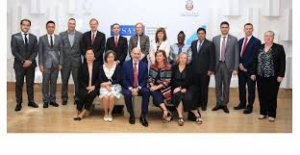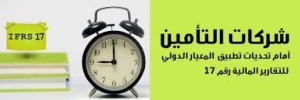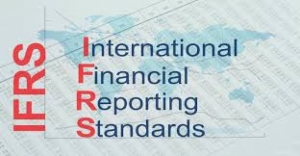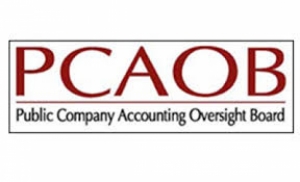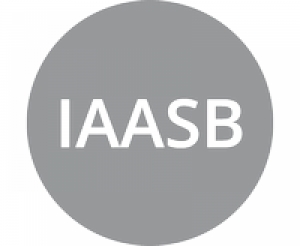عرض العناصر حسب علامة : معايير محاسبة
الإثنين, 03 فبراير 2020 09:05
معيار جديد يضيف مرونة للإجراءات المتفق عليها
سيكون لدى ممارسي سلطة الائتلاف المؤقتة مزيدًا من المرونة لأداء ارتباطات الإجراءات المتفق عليها بموجب معيار جديد أصدره يوم الخميس مجلس معايير التدقيق و المراجعة في المعهد الأمريكي للمحاسبين القانونيين
نشر في
محاسبة و مراجعة
موسومة تحت
الإثنين, 09 ديسمبر 2019 15:22
دائرة المالية - أبوظبي تستضيف اجتماع مجلس معايير المحاسبة الدولية في القطاع العام
في إطار جهودها المتواصلة لتحسين جودة وأسس إعداد البيانات المالية على مستوى الإمارة واعتماد أفضل المعايير العالمية في هذا المجال، تستضيف دائرة المالية - أبوظبي اجتماع مجلس معايير المحاسبة الدولية في القطاع العام خلال الفترة من 10 ولغاية 13 من الشهر الحالي
نشر في
محاسبة و مراجعة
موسومة تحت
الأربعاء, 04 ديسمبر 2019 20:50
أسواق التأمين العالمية تطبق المعيار المحاسبى «IFRS 17» يناير 2021
حقق المعيار المحاسبى الدولى 17 أو IFRS 17 الخاص بعقود التأمين والصادر بتاريخ 18 مايو 2017 ،وهو ما يمثل قفزة كبيرة فى طريق العرض التقليدى للقوائم المالية بشركات التأمين
نشر في
محاسبة و مراجعة
موسومة تحت
الأحد, 19 يونيو 2022 09:52
مقالات .. معيار المحاسبة 40 يعافي الاقتصاد
نشر في
محاسبة و مراجعة
موسومة تحت
الأحد, 10 نوفمبر 2019 10:30
معالجة الايردات المؤجلة طبقا للمعايير المحاسبية الدولية
نشر في
معايير محاسبة
موسومة تحت
الإثنين, 20 فبراير 2023 08:24
مجلس معايير المحاسبة المالية يسهل الإنتقال إلى معيار خسائر الائتمان
أصدر مجلس معايير المحاسبة المالية قواعد محاسبة جديدة مصممة لتسهيل الانتقال إلى معيار الخسائر الائتمانية الجديدة للمجلس من خلال توفير خيار لقياس أنواع معينة من الأصول بالقيمة العادلة.
نشر في
محاسبة و مراجعة
موسومة تحت
الأحد, 27 أكتوبر 2019 09:08
جعل الشركات الخاصة جاهزة لمعيار الإيرادات الجديد
معلومات إضافية
-
المحتوى بالإنجليزية
Get private companies ready for the new revenue standard
Auditors of private companies are reviewing clients’ efforts to prepare for filing financial statements under the new revenue recognition standard in early 2020.
In the five years since FASB adopted its landmark guidance in Accounting Standards Update No. 2014-09, Revenue From Contracts With Customers (Topic 606), companies large and small have had to race to implement the standard by its effective date.
Public companies began complying with the standard with their regulatory filings for the first quarter of 2018. Now the focus has shifted to private companies, which, in little more than half a year, are going to prepare their first set of annual financial statements with the new standard. Private company financial statements for interim reporting periods will have to comply with the standard in 2021.
In some cases the new standard may not affect companies’ reported revenue. But even private companies that don’t have a significant change to the top line of their income statements will have to satisfy additional requirements for footnote disclosures. The new standard also requires an increase in the use of estimates that will require documentation of the judgments used by the client’s management. Here are some items auditors can use as a checklist to help them gauge how well clients are preparing for the new standard’s requirements.
Assess how well the client is prepared to implement the standard. In many cases, engagement teams from BDO USA LLP are meeting or have already met with clients’ executives, said Michael Stevenson, CPA, the national practice leader for the firm’s accounting and reporting advisory services group in Dallas. The engagement teams are evaluating how well clients sized up their sources of revenue and the processes they use to execute customer contracts and enter them into the financial reporting system.
“The first step in the process is just helping management identify that there’s a call to action here that is different in the past,” Stevenson said. “There are a good number of private companies who have really looked at this as an opportunity to evaluate the business, how they interact with their customers, and how they set terms and conditions within their contracts, and they’ve put themselves in a really good spot as far as the adoption goes.”
Make sure the client is ready to follow FASB ASC Topic 606’s five-step process. The standard’s five-step process requires companies to identify the contract with the customer, identify the performance obligations in the contract, determine the transaction price, allocate the price to the performance obligations, and recognize revenue when a performance obligation is satisfied.
“They really should start their thinking from the beginning. … Who are the customers? Let’s look at the contracts,” said Douglas Reynolds, CPA, a partner in Grant Thornton LLP’s accounting principles group in Boston. “The unit of account is the contract. Then try to figure out what we promised the customer, then the price, then we allocate it to the things we’re providing, and then we figure out, when do we recognize the revenue.”
Help clients understand the new standard’s documentation requirements. For many companies, the reported revenue won’t change once they’ve completed the transition to Topic 606. But clients will have to produce more documentation to support their decisions about reported revenue.
“That’s frustrating because people are trying to run a business,” Reynolds said. Most private companies lack large staffs in their accounting policy departments and can’t do the necessary research. The time that management has to spend producing the documentation takes them away from running the business.
Are the notes to the client’s financial statements in order? The new disclosures that are required to explain the changes to comply with the new standard will take time to prepare, Reynolds said. He advised private companies that compete with public companies to review the disclosures in the regulatory filings of their competition and glean from them how the disclosures should be handled.
“Even if they don’t feel that the monetary or the numerical change is significant, if any, there’ll be some new note disclosures that we’ll need them to have a handle on, too,” said Richard Reisig, CPA, a shareholder and director in attest services at Anderson ZurMuehlen & Company PC in Great Falls, Mont. Reisig also is a member of FASB’s Private Company Council.
Continue meeting with clients and evaluating their progress. Reisig said auditors should review clients’ sources of revenue and determine if the timing in which it is recognized will change with Topic 606. The timing of the recognition is determined by the transfer of control of the good or service, and auditors and clients will have to determine which revenue streams are recognized at a point in time and which are recognized over time.
“Even if you don’t think it affects you a lot, we’re going to need this information from you, so let’s start gathering that now,” Reisig said.
Grant Thornton’s Reynolds said that with little more than six months to go before the end of the year, auditors will need to push clients to ensure that they can prepare financial statements that adhere to the new U.S. GAAP requirements. If for some reason they won’t be able to comply with the standard, the sooner they know about the nonconformance with GAAP, the more time they have to address it.
“I don’t think a company would want to call a bank in January 2020 and say, ‘We just figured out that when we get done closing the books, we might need a waiver,’” Reynolds said. “They need to know what’s going to happen before the period’s over to work with their lenders.”
نشر في
محاسبة و مراجعة
موسومة تحت
الثلاثاء, 08 أكتوبر 2019 14:34
الشركة العامة لمجلس الرقابة المحاسبية تصدر توجيهات للموظفين بشأن مراجعة الحسابات
أصدرت الشركة العامة لمجلس الرقابة المحاسبية أربع وثائق توجيهية للموظفين يوم الخميس مصممة لمساعدة مدققي و مراجعي الحسابات على تطبيق المعايير والتعديلات الجديدة لمجلس الإدارة بشأن تدقيق و مراجعة تقديرات المحاسبة وإستخدام المراجع لعمل المتخصصين.
معلومات إضافية
-
المحتوى بالإنجليزية
PCAOB issues staff guidance on auditing estimates, specialists
The PCAOB released four staff guidance documents Thursday that are designed to help auditors implement the board’s new standards and amendments on auditing accounting estimates and the auditor’s use of the work of specialists.
The new standards will take effect for audits of financial statements for fiscal years ending on or after Dec. 15, 2020.
The staff guidance issued Thursday is contained in the following documents:
Auditing Accounting Estimates.
Auditing the Fair Value of Financial Instruments.
Supervising or Using the Work of an Auditor’s Specialist.
Using the Work of a Company’s Specialist.
The accounting estimates and fair value documents provide information on the PCAOB’s new standard for auditing accounting estimates and highlight changes made to integrate the PCAOB’s risk assessment requirements when auditing accounting estimates, including fair value measurements.
The other two documents highlight aspects of new requirements that apply when auditors use the work of specialists in an audit and when an auditor uses the work of a company specialist as audit evidence.
نشر في
محاسبة و مراجعة
موسومة تحت
الثلاثاء, 08 أكتوبر 2019 12:39
مجلس معايير المراجعة والتأكيد الدولي يهدف إلى تعزيز مراجعات جودة الإرتباط
تم تصميم معايير جديدة مُقترحة من قِبَل مجلس معايير التدقيق والتأكيد الدولي لضمان أن تكون مراجعات جودة الإرتباط قوية ومتينة وتدعم الإرتباطات عالية الجودة.
معلومات إضافية
-
المحتوى بالإنجليزية
IAASB aims to enhance engagement quality reviews
New standards proposed by the International Auditing and Assurance Standards Board (IAASB) are designed to ensure that engagement quality reviews continue to be robust and support high-quality engagements.
The IAASB is proposing changes that would include:
Altering the eligibility criteria to perform an engagement quality review.
Changes related to the engagement quality reviewer’s performance and documentation.
Strengthening of the selection of engagements for review.
The proposed changes are explained in the following documents:
An overall explanatory memorandum, The IAASB’s Exposure Drafts for Quality Management at the Firm and Engagement Level, Including Engagement Quality Reviews.
Proposed International Standard on Quality Management 1, Quality Management for Firms That Perform Audits or Reviews of Financial Statements, or Other Assurance or Related Services Engagements.
Proposed International Standard on Quality Management 2, Engagement Quality Reviews.
Proposed International Standard on Auditing 220 (Revised), Quality Management for an Audit of Financial Statements.
Comments are due by 1 July, and the IAASB is requesting that responses be made separately to each of the exposure drafts and the overall explanatory memorandum.
نشر في
محاسبة و مراجعة
موسومة تحت
الثلاثاء, 16 يوليو 2019 20:36
السعودية تستضيف مجلس معايير أخلاقيات مهنة المحاسبة الدولي
استضافت الهيئة السعودية للمحاسبين القانونيين ورشة عمل لمناقشة أبرز تحديثات قواعد سلوك وآداب مهنة المحاسبة الجديد 2018 والذي قدمها ممثلين من مجلس معايير أخلاقيات المهنة الدولي وامتدت ليومين بمدينة الرياض بحضور ممثلين من الهيئات المهنية الخليجية وعددا من ممثلي الجهات الحكومية والمحاسبين القانونيين.
نشر في
تكنولوجيا المعلومات
موسومة تحت


